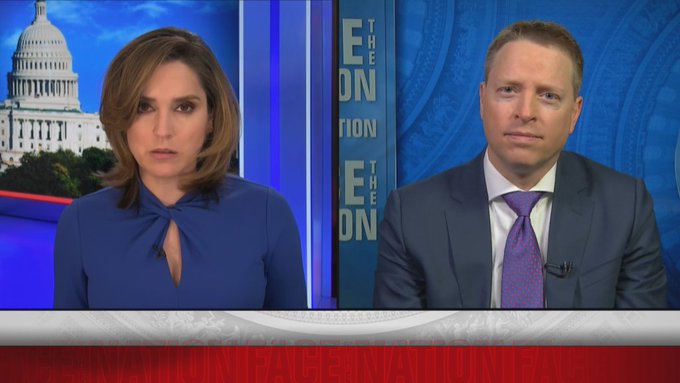Kudos to CBS Face the Nation moderator Margaret Brennan for her excellent interview of former Trump Administration Deputy National Security Advisor, Matthew F. Pottinger, surrounding several facets of the Trump Administration’s COVID-19 response. The discussion warrants further review and straightforward, nonpartisan discussion. Pottinger’s perspective as a former Marine Corps officer and Wall Street Journal reporter covering China brought to light several systemic deficiencies at the Centers for Disease Control (CDC) that marred, from the outset, multiple facets of the Administration’s collective response.
Many of these deficiencies – “a rusty culture accumulating barnacles,” he pointed out with multiple examples — also underscore how President Biden and future White House occupants will continue to be hampered in future pandemic responses unless reforms are instituted.
But this post, per se, is not a blame-shifting exercise. There were obvious mistakes in Washington beyond the maze of corridors at the Atlanta-based CDC headquarters. The politicization of mask-wearing is number one on the hit parade of errors. The fact some still deny this was a causal factor in the pandemic’s acceleration speaks to the existing national divide on basic, public health truths. But beyond the already well-tread ground of gratuitous Trump-bashing — which adds zero value-added insight into improving federal and state government response to future pandemics – Pottinger offered the sharp insight of a former journalist and subject matter expert.
To date, no interview of a consequential Trump Administration official had been this substantive, constructive and worthy of follow-up comment and observations.
A contextual, parenthetical disclaimer to this post: From June 2020 through December, I took a leave of absence from my business to serve as a senior advisor at the U.S. Department of Health and Human Services (HHS). With a health policy background in the eldercare and pharmaceutical sectors, I decided diving into the deep-end of the pandemic response during a time of crisis in nursing homes and other congregate settings was a once in a lifetime chance to apply policy knowledge in the field — not just execute advocacy plans on Capitol Hill. Indeed it was. My HHS colleagues were highly-competent, level-headed professionals and policy experts deserving praise for their thankless service in this most challenging environment. No doubt the new Biden team will serve in the same dedicated manner, and wish them well as they face their own, growing media and policy conundrums.
Nevertheless, the Pottinger Face the Nation interview was so insightful and applicable to my own HHS observations regarding CDC that I decided to make this my first 2021 business blog post — surely a more worthy topic than, say, a partisan rant trashing NY Governor Andrew Cuomo’s nursing home death imbroglio. I offer no worthwhile value-added on that matter whereas the following Pottinger comments — excerpts from the longer CBS transcript — speak intelligently for themselves:
MARGARET BRENNAN: I’ve heard you on all the criticisms of the CDC and you’ve highlighted some really specific areas for them to improve.
POTTINGER: The CDC is set up kind of like an academic institution. You’ve got these siloed centers — and within the siloed centers, you have siloed divisions and then siloed branches under those divisions. There is not a super body within the CDC that is able to reach in and do pandemic prevention and response. Those functions are sort of divided. There’s an assistant secretariat for pandemic response at the Health and Human Services Department. And what would happen is CDC and ASPR (Assistant Secretary for Preparedness and Response), as it’s known, would sometimes think that the other was responsible for critical functions and then things would fall by the wayside. My view is that they should establish a new super body for pandemic preparedness and response within the CDC — probably move it from Atlanta into Washington, D.C., so that person who’s in charge of that can also be attached to the White House.
MARGARET BRENNAN: So this is your prime reform to the CDC to prevent us from being sucker-punched the next time?
POTTINGER: That’s one of them. The other one would be to create a centers for lessons learned — like the military has for each of its service branches. You have a quasi-independent body of investigators who can go in and talk to anybody and everybody, collect lessons learned in real time and then report. It’s important that the director of the CDC and the other senior leadership actually listen to those reports and implement the lessons learned so that you’ve got a living organization that’s learning. That is not, unfortunately, what the CDC is today. So the final thing really about the CDC is cultural. The CDC has developed over the years, even though it’s got great talent in there and- and well-meaning people and a lot of expertise, it’s developed an academic kind of mindset.
MARGARET BRENNAN: When you say the CDC, just to- just to be clear, when you say the CDC, are you talking about Director [Robert] Redfield?
POTTINGER: I’m talking about the institution as a whole. I’m not pinning this on Bob Redfield. The problems of the CDC predate by many, many years Bob Redfield’s tenure. Bob Redfield did the very best that he could with what he had. I’m talking about institutionally in the belly of this institution, the CDC was unwilling to partner with industrial labs to do tens of thousands of sequences — so that you could actually see where this thing was going. They wanted to do it internally. And I think the reason for that is they want the data themselves so that they can publish. There’s a very powerful incentive within CDC culture to partner with academic institutions rather than private institutions — and to collect data, submit for peer review articles that burnish your credentials. That’s a very slow process. That’s not the- the kind of incentive you want for dealing with a fast-moving pandemic… So what you have here is a rusty culture. It’s accumulating barnacles. It’s becoming hidebound, academic and- and not a fleet of foot sort of shock force for dealing with with these kinds of outbreaks that we’re wrestling with now.
MARGARET BRENNAN: How much of this is a question of if this should be handled by public health officials at all, or whether a pandemic should be handed over to intelligence officials and handled like a national security threat?
POTTINGER: The intelligence community does need to prioritize the collection of intelligence on these kinds of bio threats rather than relying strictly on sister-to-sister relationships between our CDC and public health officials in other countries. But I don’t think that the intelligence community is going to be able to do more than that critical role of collecting and analyzing the information… And so what I’m trying to bring to light here is that we have a deeper problem with the permanent government in how we are organized culturally and organizationally to deal with this pandemic and with future ones. I want us to succeed at getting better.
MARGARET BRENNAN: So to that end, you think that you have information about the pandemic response that the Biden administration needs to know?
POTTINGER: Oh, I do, absolutely. I mean, I would start with just reviewing, again, some of the missteps that were made. The first misjudgment by the public health establishment was misjudging the nature of this virus. And so the playbook that we threw at it was the influenza playbook. Remember, we- we’ve been preparing for really for decades for a flu pandemic. But COVID behaves differently from flu in really critical ways that led us astray. The most important, of course, is that it spreads asymptomatically and that misjudgment led to the next few mistakes. One, of course, was that we were screening for the disease as if it were flu, throwing tools at it like temperature screening, which we’re not going to work when you had asymptomatic spread as well as diagnostics. With flu, you don’t need a massive effort at diagnostics, because we already know so much about the flu.
MARGARET BRENNAN: — Why is it that you were seeing and hearing things from doctors that the official health organizations were not getting?
POTTINGER: Yeah, it’s an indictment of the WHO certainly, but it also troubles me that the CDC was not talking to a broader range of people on the ground. We had about a dozen CDC officers in China. We have lots of CDC officers in the United States who deal with Chinese doctors. But you’re right. I had covered the SARS epidemic back in 2003 when I was living in China, writing for the Wall Street Journal. So I dusted off some of my old contacts and talked to Chinese doctors who had firsthand information about this pandemic. And they were very open. They said, yeah, this thing is not going to be like SARS 2003. It’s going to be like the 1918 flu pandemic because it’s spreading silently.
MARGARET BRENNAN: And Dr. Fauci recounted to Bob Woodward in that book “Rage,” that he was hearing you say these things in January and thought you were overreacting and then, months later, then said Matt was right. Was the administration being intentionally misled here or was it a problem in terms of how our own public health officials consumed information?
POTTINGER: Yeah, I don’t think anyone in the United States was intentionally misleading anybody else, I think that we were accustomed to dealing with governments that act in good faith. And when you’re talking about the Chinese Communist Party in a- in a, you know, in an authoritarian regime that cares about nothing other than its own survival, we were a little bit too credulous. We were waiting to be fed information. When the nature of that regime meant that we were not going to get that information, they had a strong incentive to mislead their own public and the rest of the world about the nature of this virus. And that’s why we’re paying the price that we paid. You know, so that misjudgment about the nature of the virus, because we were waiting for information- by the way, we should have our intelligence community prioritizing the collection of information about bio threats, including natural or unnatural bio threats when it comes to these kinds of totalitarian dictatorships that are not going to come clean. We would have had better information from the government of certainly Rwanda, Kenya, any number of- of developing nations would have had better information, faster for us and for the world than Beijing was willing to share because they had a profound incentive to cover this thing up.
See entire transcript for complete interview.

